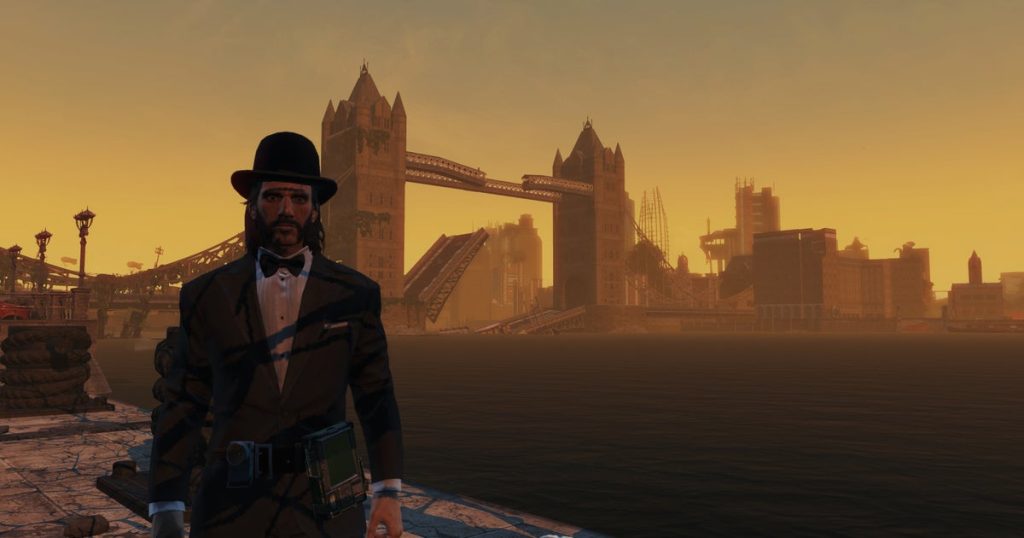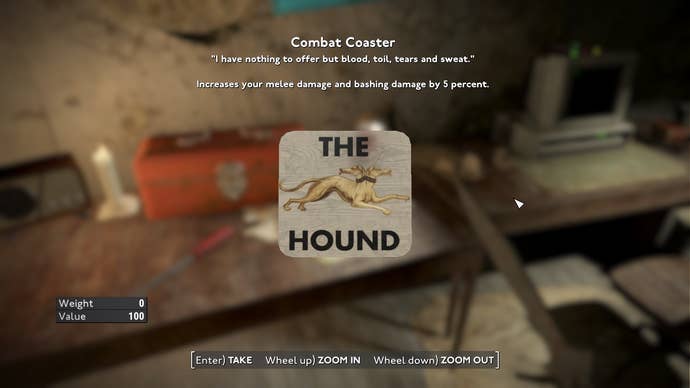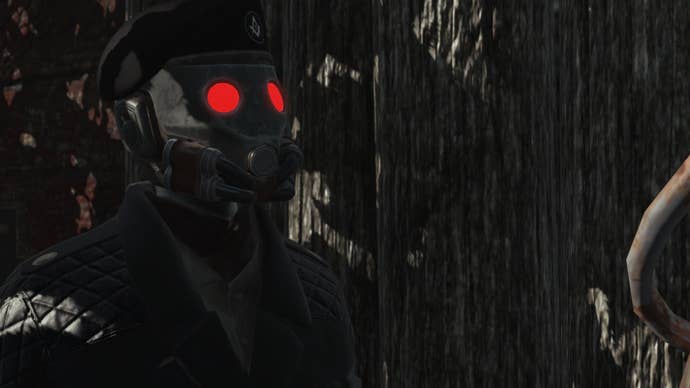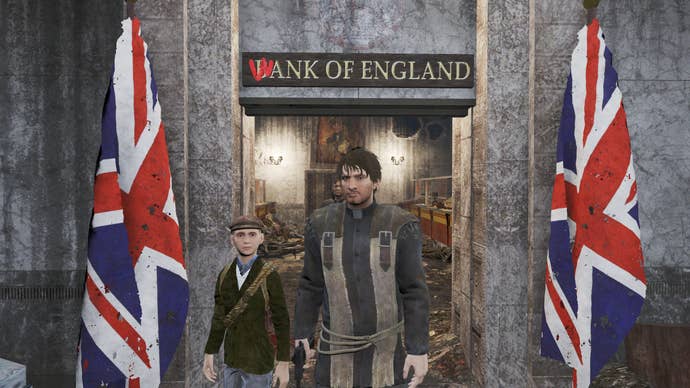
“Don’t.”
That’s the first thing Fallout: London project manager Dean ‘Prilladog’ Carter, through a cheeky grin and a chuckle, says when I ask him, aside from the obvious point of not being a modding novice, what advice he might give to someone who sees the massive Fallout 4 mod and decides to embark on a similar project of their own.
He’s obviously joking, but there’s a serious point to be made in there – don’t sign up for something like this unless you’ve got a good idea of what you’re in for and are sure you want to do it.
Having now come through the development of the massive mod, Team FOLON knows better than any other group of people on earth exactly what it takes to deliver a project this expansive and impressive while working on an amateur basis, but it took a lot of adapting and learning to get there.
Take the mod’s sheer scale, managing the balance between sticking to the plan feature-wise and allowing moments of creative inspiration to happen mid-development. “I guess in a weird way we didn’t [do that], which is why the scale got so big,” Carter says. “Content creep kills projects, that’s just a known fact. We definitely – because obviously the project was started during the pandemic – we had two years to just throw things at the wall and see what stuck and it got out of control, but we then conquered that Everest,” he continues, adding: Once we had sort of got to like the top of the peak, we were so sort of fatigued from all the other ideas that we put in, we were like, ‘Okay, by this point we’re now a bit more grounded’.”
Armed with the motivating factor of knowing that there wasn’t going to be another pandemic to give it another “two years worth of free time”, Team FOLON got a grip on its priorities and became used to asking tough but necessary questions – “‘Do we need this? No.’ ‘Do we have the time to put in this whole thing? No.’”

While projects of this nature are often seen as having different vibes to their cousins in the games industry itself, which are being developed by for-profit studios which don’t exist in the sort of grey area between work and hobby that modding does, Carter says that Team FOLON had to least partially adopt some of the same mindset as professionals do in terms of making Fallout: London a reality. Naturally, without a lot the team volunteering their own time without any kind of pay in order to work on the mod, a unique approach was needed by the project’s leads in terms of managing people.
“We’ve received a lot of feedback on this. I don’t want to say flak, but we have run this basically, as [though] we were a [professional] studio,” Carter admits, “I feel like in order to get things over the line, you have to.” “Now, don’t get me wrong, there’s an element of hobby to this, and that’s one of the things that we asked people when they joined,” he explains, “We literally said ‘What is your goal from this?’ Some people flat out said ‘I want to get involved in this because I want to get a job in the industry’. Some people have said they want to get involved because it’s a hobby, [saying things like] ‘I want to work weekends on something fun with other people’. We let them tell us what they want to do, or how they expect to work and obviously that can change in development, but that then tells me as the project manager, how I can manage that person.
“It sounds weird to say, but if your goal is to work in the industry, you’re going to have a wake-up call, if you go from working at Sainsbury’s and then are then suddenly in one of the most fast-paced industries where you’re required to do this, this and this and then the company says, ‘We’re gonna start crunching’. It’ll be such a wake-up call, you’ll be like ‘No, can’t do it’, and burn out. Whereas if you work like that for free in one of these projects, you’re going to be prepared and what we’ve noticed [is that] people have done that and then gone to a studio or whatever, they hit the ground running. We’ve got multiple people now who’ve gone to a gaming studio and within the time our mod’s taken to finish, they’ve already been promoted and they’ve literally said ‘You prepped us very well for that.’”
The leads also had to work out how to approach two of the most difficult things any studio, whether professional or amateur, can face – sudden staff departures, and maintaining a positive relationship with would-be players. In terms of the former, Team FOLON had to deal with the Russo-Ukranian war, necessitating developers involved in key questlines to suddenly – and unavoidably – abandon their posts and leaving the team with no choice but to find ways to keep calm and carry on.

“We’re not some giant corporate entity where if we suddenly lose these people, we can just pay more people and then they come in and do the job quick,” Carter tells me, “We’re a small team and there’s the human element, like if – touch wood it doesn’t happen – but if something were to happen to me, then that’s going to drastically impact the team. If any of the heads of department had anything happen to them. Over the course of development we’ve all had losses in our life, you know, it happens.
“That’s the human element, and you know what, I probably still wouldn’t change that. I don’t like the fact that we could just be like, ‘Oh, I’ve known you for four years, bomp, I’ve got to find a replacement’. I actually really don’t like that and when I hear, because obviously the industry has this problem at the moment, that’s why they’re starting to make these unions and there’s these new laws and people are now protesting about it. So yeah, I don’t like the replaceability of people. I think it dehumanises them and I love the tight-knit family [feel we have].”
Then, there’s the latter, with Carter emphasising that Team FOLON’s taken the approach not of letting its developers say whatever they like in the mod’s public Discord without repercussions, but aiming to deal with any badly handled situations in an even-handed manner. “We will have meetings and we’ll say to people ‘a lot of it is going to be for every 10 people that really enjoy it, there’ll be that one person that will come at you’,” the modder says, adding that Reddit in particular has been a challenge in this regard.
“There are times where I don’t deny, even myself, when you’re trying to do the PR front, the facade will slip,” he says, “We’re only human at the end of the day and there will be someone that’s being, you know, they’ll be saying some vitriol at you, and then you’ll basically just tell them in an impolite way to leave the server. It’s like we’re humans, you know, and it happens and we’ve messaged [team members] after that [saying] ‘You could have done that better’. At the end of the day, that’s one thing that I actually quite enjoy about going on to run our own company, because I don’t think I’d want to run it particularly differently. We ask for humans and I don’t want us to move into like this corporate sphere and then become anything less than we are. One of our biggest strengths is that we are humans, [and] we interact with other people as humans.”

Carter says this fundamental approach and emphasis on the human element is something he’s adamant about Team FOLON maintaining as it makes the likely next step some of its members have been hinting at in different ways for a little while now – becoming a full-on indie game studio.
“Basically all I envision of our future endeavours is that we’ll be working on a different game,” the modder tells me. “The server wouldn’t necessarily change, how we talk to people wouldn’t change, and to be honest I’d say that if an investor came up to us and was like, ‘Well you have to do this, this, and this’, I’d be like ‘No, I’ll find someone else that fits in with us more’. I would rather be happy in our development and enjoy what we do, then become a soulless entity just doing what shareholders say.”
For now, though, as it focuses on putting out fixes for and eventually adding content it had to cut back into Fallout: London, the group has plans to try and help give anyone it might inspire to start their own foray into the world of large-scale modding projects go in with a clear picture of what doing so means. There are a number of aspects of this Carter thinks people may well not be aware of, from having to organise paying to maintain basic project essentials like a website and even something like Discord to allow your team to communicate, to the fact that you may well not end up getting “a pat on the head” from the company behind the game you’re modding, even if it does do you the solid of allowing you to mod its games.

“The [community] really wants us to do some sort of video that basically explains all of this stuff in detail,” Carter says, “I hope from that video, because we will do it, where we explain it, it’s not going to be from a sense of entitlement or that we know best, because we’re just modders.”
He adds: “The problem with inspiration is it might seem like a good idea, but you might not realise how much like this has to take over your life to do. If I had worked the hours I’ve worked in a job now, I don’t know, I would probably be in a much bigger house right now. But no, I haven’t been working, I’ve been working in the creation kit for free, for no money, my savings are f**king obliterated, excuse my swearing, like they are gone.
“People don’t realise the sacrifice that goes into things like this and that’s the biggest thing, is you can be inspired, but understand the sacrifice. The biggest bit of advice is do your research on how long and how many man hours combined this takes and if you can’t do that, then just watch other people do it, I would say.”














